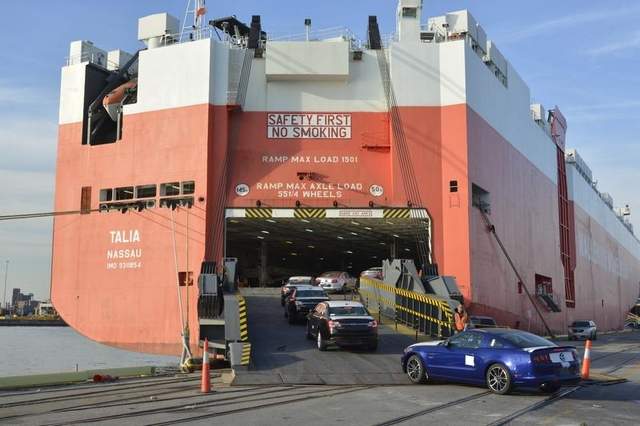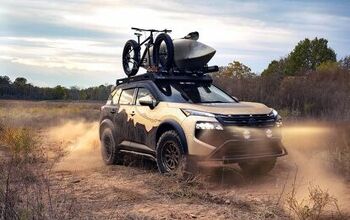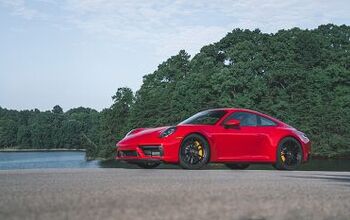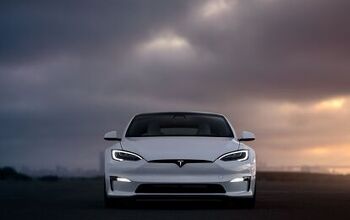U.S. Car Exports to Hit Record 2 Million, Half From Domestic Brands
Fords are loaded for export at the Port of Baltimore. Photo: Bill McAllen / Port of Baltimore
When most people think about countries that export cars one name that’s usually not on their list is the United States, but the U.S. is exporting more cars than ever. According to the Detroit News, the record total this year is likely to reach 2 million units and perhaps even more surprising than that number if the fact that half of the exports are cars made by GM, Ford and Chrysler. The remainder come from assembly plants located in the U.S. owned by German, Japanese and Korean automakers. Cars are the most valuable manufacturing export from the U.S., followed by aerospace. Spurring the growth in exports is the fact that the United States is currently one of the less expensive places to build a car, due to favorable currency exchange rates and reduced labor costs.
According to the United States Commerce Dept., last year’s automotive exports totaled $132.7 billion on approximately 1.8 million exported cars and trucks. The automotive trade deficit is still more than $100 billion with car imports grossly outweighing exports, but that deficit has been shrinking.
As would be expected, about half of U.S. automotive exports are to neighboring Canada and Mexico but the biggest growth is coming from outside of North America. Less than 10 years ago shipments to Mexico and Canada accounted for 80% of all U.S. vehicle exports. Now that figure is down to 49% and it continues to fall. Shipments to China have grown almost 600% since 2009 and one in nine vehicles exported from the U.S. now goes to China. Chrysler exports Jeeps there and next year Ford will being exporting Lincolns to China starting late next year.
Analysts say that U.S. car exports will likely not fall off as the Big 3 and their global competitors add more capacity inside China. That is because other markets in Latin American, Africa and the Mideast will continue to see increased demand for U.S. built cars and trucks. Still, the fastest growing markets, the so-called BRIC countries of Brazil, Russia, India and China, are where car companies are building factories, following Isaac Singer and Henry Ford’s philosophy of “build where you sell”, so there may be a limit on export growth here in the U.S.
In addition to the domestics, Honda and Toyota both want to boost exports from the U.S. Honda wants all of its global regions to be export hubs, shipping 20-30% of their production out of their local markets. Honda says that its eventual goal is to export more cars from the U.S. than it’s importing here from Japan. Toyota recently added the Highlander to the its list of vehicles exported from its assembly operation in the U.S.
Most of the cars and trucks exported from the U.S. are models that are also sold here. Ford’s F-150, built in Dearborn, Michigan and Kansas City, Missouri, is exported to 49 countries. Joining Ford’s flagship pickup truck overseas will be the all-new 2015 Mustang. The new Mustang was designed specifically with export markets in mind, that is one reason why the car will over a turbocharged four cylinder engine. The Mustang is built in Flat Rock, Michigan and the assembly line there will also produce right hand drive versions for the UK, Australia and Japan.
Also built in the Detroit area specifically for export is the Opel Ampera, Opel’s version of the Chevy Volt, which is assembled at GM’s Detroit-Hamtramck plant.
During the restructuring of the U.S. auto industry, in 2009 the United Auto Workers agreed to a two-tier wage system, with new hires making a little more than half of what veteran autoworkers make. Those agreements have secured the assignment of lots of production to the North American facilities operated by the domestic car companies. Those companies have also earmarked billions of dollars in upgrading existing U.S. plants to increase production.
While their assembly plants in the U.S. don’t use UAW labor, the strength of the Japanese currency, the yen, relative to the U.S. dollar, has made the U.S. a more attractive place for Japanese automakers to build their cars than back home.
More by TTAC Staff
Latest Car Reviews
Read moreLatest Product Reviews
Read moreRecent Comments
- Jeff I like the looks of this Mustang sure it doesn't look like the original but it is a nice looking car. It sure beats the looks of most of today's vehicles at least it doesn't have a huge grill that resembles a fish.
- Doc423 SDC's are still a LONG way off, 15-20 years minimum.
- CanadaCraig Luke24. You didn't answer MY question.
- Jeff I have never bought summer tires just all season and sometimes snow tires. Up until the last few years I had 2 midsize trucks which had 15 inch tires and when I got tires the last time for both I had a choice of just 2 tires Goodyear and Hankook all season tires. Hard to get any tires size 15 and below
- MaintenanceCosts This is probably as good as B5.5's get, but keeping it that way is going to be very very expensive, and for all that money you won't even have three pedals.


































Comments
Join the conversation
@DiM - interesting new spin, now you expect to see the Colorado sell like hotcakes because government agencies are only allowed to buy from "domestic" brands. The Tacoma is built in the USA and therefore meets the definition of a domestic product but only 5% of them go to fleets. You are really reaching there - 100,000 Colorado's all with a municipal, state, or federal logo on the door. Can I quote you in a years time once fleet and retail numbers get posted? You need to research more before you speak - the Boss 302 was built specifically to beat the M3 on a track. The GT Mustang will not run with an M3. The Boss 302 barely does and only if you use the track key.
@DenverMike - I can see why people are loyal to domestic brands but as I have said earlier, the Big 3 have abused that privilege. I will buy what I feel will give me reliable service for the price I am willing to pay. I own a F150 and my wife has a Sienna. Both were built in the USA. I'd consider a home built product only if it meets my criteria. Machines aren't loyal. They just perform the tasks they are designed to do. Those machines are often associated with fond memories which adds sentimentality to the mix. We attach personality to those machines which increases those emotions. Car companies are not loyal to us and they exploit that sentimentality. I have friends in various trades and business. I will use their services or products because of that friendship. I don't mind paying a bit more to support those friends. The caveat is if they are shitty at what they do, I will not support that. A friend will wake up at 3 AM to help you out but the machine I own will just respond to the turn of a key.